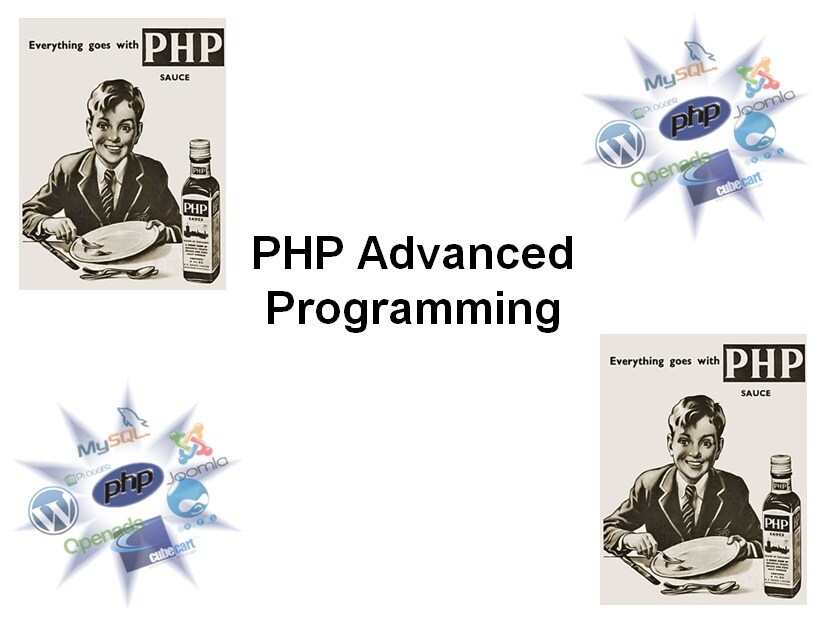-
Learning by doing
-
Trainers with practical experience
-
Classroom training
-
Detailed course material
-
Clear content description
-
Tailormade content possible
-
Training that proceeds
-
Small groups
The course Advanced PHP Programming covers advanced features of PHP.
In the first place it is addressed how to deal with Object Orientation in PHP. Attention is paid to the known object oriented concepts like classes and objects, encapsulation and inheritance and how PHP deals with them.
Also the concept of Exception Handling is covered. New features of PHP 7 are discussed as well.
Another issue is how to handle XML and JSON in PHP. Various XML libraries in PHP are discussed, such as libraries for SAX, DOM, SimpleXML and XPath. Also attention is paid to the handling of JSON data with the JSON library functions.
The use of regular expressions in PHP is also part of the subject matter.
Attention is paid to various libraries for database access such as PDO, PHP Data Objects. Database abstraction, transactions and SQL joins are also discussed.
Further attention is payed to several aspects of security such as security threats, authentication and SSL.
In the following module it is discussed how interactive PHP Ajax Web Applications can be developed. The XAJAX Framework is addressed in this respect.
In the module Web Services both SOAP and REST Services are discussed.
Finally an overview of Design Patterns is given and a number of Design Patterns in PHP applications are treated. In conjunction with the course PHP Programming this course covers the requirements for the Zend PHP Certification exam.
The course Advanced PHP Programming is intended for PHP web developers with basic knowledge of PHP who want to make advanced use of PHP to write dynamic Web applications.
To participate in this course knowledge and experience with PHP is required as is discussed in the course PHP Programming.
The concepts are treated on the basis of presentation slides. Demos are used to clarify the theory. The theory is interspersed with exercises. The course uses PHP 7 which is installed in a WAMP package with the Apache Web server and MySQL.
Participants receive an official certificate Advanced PHP Programming after successful completion of the course.

Module 1 : Classes and Objects |
Module 2 : Inheritance |
Module 3 : Exception Handling |
| Object Oriented Programming Class Definition Creating Objects Encapsulation and Data Hiding Private Data Constructors and Destructors $this Variable Default Field Values Static Members Class Constants Object References Cloning Objects |
Derived Classes Base Class Access Constructor Visibility Overriding Methods Pseudo Constants Final Classes and Methods Abstract Classes Implementing Interfaces instanceOf Operator Polymorphism Type Hinting Catchable Type Errors |
Types of Errors Exceptions in PHP try, catch and finally Exception Handling Rules Exception Class Exception Specialization User Defined Exceptions Multiple catch Clauses Standard PHP Exceptions Main Exception Branches RunTime Exceptions Turn Errors into Exceptions |
Module 4 : PHP 7 Features |
Module 5 : XML and JSON |
Module 6 : Regular Expressions |
|
Scalar Type Declarations Coercive and Strict Mode Return Type Declarations Null Coalescing Operator Spaceship Operator Constant Arrays Anonymous Classes Closure::call() Filtered unserialize() Expectations Use Statement Error Handling |
XML Extensions for PHP SimpleXML Load XML from File and String Reading Attributes and Elements Creating XML Data Document Object Model DOM Validation SAX, Simple API for XML Using XPath in PHP PHP JSON Functions JSON Syntax Encoding and Decoding JSON |
Regular Expressions in PHP PHP Regular Expression Functions Meta Characters Quantifiers and Character Classes Regular Expression Modifiers Matching Text with preg_match Matching on Word Boundaries Matching Text with preg_match_all Greedy and Non-Greedy Quantifier Replacing Text with preg_replace Splitting Text with preg_split Searching Text with preg_grep |
Module 7 : Databases Access |
Module 8 : Security |
Module 9 : PHP and Ajax |
|
PHP Data Objects Data Access with PDO Creating and Closing Connections PDO Error Retrieval Select Queries Fetching Results Direct Query Execution Array and Column Fetching PDO Transactions Prepared Statements Calling Stored Procedures |
Security Issues Register Globals Spoofed Form Submissions Cross Site Scripting Validating Input SQL Injection Cross Site Request Forgery HTTP Authentication SSL Overview SSL Handshakes Configuring SSL in Apache |
Classic Web Application Model Ajax Web Application Model Typical Ajax Interactions Drawbacks of Ajax Creating the XMLHttpRequest Object Methods Sending the Request Object Properties XMLHttpRequest readyState Handling the Response PHP and Ajax, XAJAX |
Module 10 : Web Services |
Module 11 : Design Patterns |
|
|
REST versus SOAP SOAP Messages WSDL and Code Generation PHP SOAP Extension WSDL for SoapService PHP SOAP Services REST Services Everything an Id Standard HTTP Methods Content Negotiation |
What are Patterns? Singleton Pattern Defined Singleton Pattern Usage Adapter Pattern Factory Patterns Factory Method Pattern Abstract Factory Pattern Abstract Factory Usage Observer Pattern Iterator Pattern |
